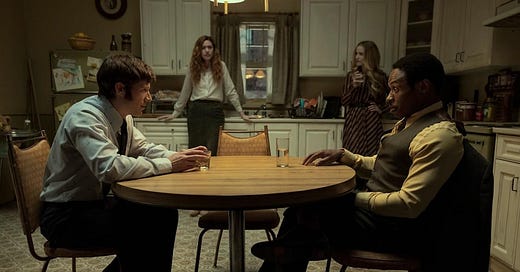The Fall of the House of Usher (and Auguste Dupin)
Investigative errors that cannot be blamed on the supernatural
SPOILER ALERT FOR THE FALL OF THE HOUSE OF USHER
The new Netflix show The Fall of the House of Usher is great, but it also happens to offer a cautionary tale in how a white-collar criminal investigation can blow up, even without supernatural intervention! I used to prosecute health care fraud cases in real life, and Auguste Dupin makes some huge errors that real-life investigators and lawyers hopefully would avoid making!
Back in 1979, Dupin has some promising leads. He has patient-consent forms that he believes have been falsified. He approaches Roderick Usher, who at the time is a low-level employee at Fortunato. Usher agrees to help Dupin by searching the company’s files for additional documents and by testifying in a deposition, but he betrays Dupin by lying in a deposition.
Dupin’s career is ruined, but he did bring this upon himself.
First, Dupin should have had someone with him when he interviewed Usher (or any significant witness). This way, if the witness changed his or her story later, there would be “provers” who could testify about what the witness originally said if necessary, rather than just having one person’s uncorroborated word against another’s.
Second, Dupin should not have asked Usher to look for files in Fortunato’s basement. This was an illegal search that likely would have been suppressed and would have tainted the entire investigation even if Usher had not lied. Instead, Dupin should have used Usher’s information to get a search warrant for Fortunato’s offices.
Third, Dupin probably should not have even talked to Usher in the first place. An investigator talking to a former employee is standard practice, but talking to current employees like Usher can get very complicated. By talking to Usher at all, Dupin may have even violated ethical rules.
Dupin did not follow basic investigative rules in 1979, and his downfall really was well-deserved, even if he had good intentions.
And years later, in 2023, Dupin fails to follow some basic investigative principles yet again.
First, he prosecutes Roderick Usher despite having a personal connection that should have raised serious questions of bias. In real life, he should have been recused from the case because of the conflict of interest, or at least the appearance of a conflict of interest.
Second, he lies in his opening statement about having an informant from among the family. This was unethical and probably violated basic discovery principles, but it also was a terrible strategic move. No prosecutor should promise something in an opening statement that they do not believe that the evidence will show, because the defense will rightfully point out in closing arguments where those promises fell short.
OK, Dupin did a lot wrong. But is there a way that Dupin could have still brought down Roderick Usher, at least in 1979?
Roderick and Madeline Usher had a clever plan, but there is one angle that they overlooked.
Dupin could have asked Annabel Lee to help. She knew that her husband’s signature had been forged, she could corroborate Dupin’s word against her husband’s, and she was so disgusted with her husband’s lies that she ultimately ended the marriage.
Spousal privilege would not help Roderick Usher much here. One type of privilege protects confidential communications between spouses, but it would not apply to conversations that took place in Dupin’s or Madeline’s presence. Another type allows a person to refuse to testify against their spouse, but this would have limited benefit. New York law would not allow Usher to prevent his wife (or ex-wife) from testifying against him, and federal law would only bar the government from subpoenaing Annabelle Lee to testify against her husband.
If Annabel Lee voluntarily agreed to help, then Roderick and Madeline both could have been charged with conspiracy to commit perjury. By 1980, Roderick and Madeline had some supernatural help that probably would have helped them avoid conviction, but Dupin at least could have had a chance!
About the Author: I was a federal prosecutor from 2008 to 2019 in the U.S. Attorney’s Office for the Northern District of Illinois (Chicago) and served as senior counsel to my office’s health care fraud unit. Since 2019, I have been in private practice and am now a solo practitioner focusing on health care fraud and data analytics.




